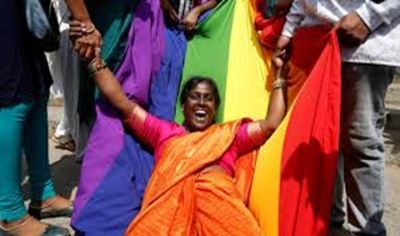Context-
Following a “manifesto moment” in the lead-up to the 2024 general election where several major political parties pledged support for the LGBTQ+ community, the 2024 Union Budget has dashed the hopes of queer Indians yearning for recognition in national politics.
Manifesto Support for LGBTQ
● A transformative overhaul of the government’s approach towards LGBTQ+ rights was never expected especially given the Solicitor General’s vehement opposition to marriage equality before the Supreme Court of India last year. Yet, the mention of transgender rights in the Bharatiya Janata Party (BJP)’s own manifesto had sparked a glimmer of hope for progress under a Modi 3.0 government.
● Instead, the LGBTQ+ community found itself reduced to a mere footnote in the Budget: the Ministry of Social Justice and Empowerment’s allocation for “Comprehensive Rehabilitation for Welfare of Transgender Persons” under the Support for Marginalized Individuals for Livelihood and Enterprise (SMILE) programme. This programme promises to fund Garima Grahas (shelter homes), scholarships, and the National Council for Transgender Persons.
Meagre funding for crucial programmes
● Smile Programme: On paper, the budgetary outlay for transgender welfare increased from ₹52.91 crore in FY24 to ₹68.46 crore in FY25. But a closer look reveals a harsh reality: actual expenditure was a meagre ₹22.82 crore in FY24. Nowhere is the impact of this discrepancy more starkly reflected than in the fact that most Garima Grahas have shut down over the past two years due to lack of funding, and the NCTP is barely functional.
● Funding for NACO : SMILE is not the only victim of the government’s apathy. Even more troubling is the reduction in funding for the National AIDS Control Organisation (NACO) from ₹3,079.97 crore in FY24 to ₹2,892.00 crore in FY25. NACO, tasked with both combating HIV/AIDS and preventing Sexually transmitted infections, plays a crucial role in public health. Despite decades of progress, India still faces one of the largest HIV epidemics in the world, with LGBTQ+ Indians at a higher risk of contracting the virus and facing distinct psychosocial challenges. Today, over 2.4 million people in India live with HIV. Of those, almost 900,000 are not linked to treatment—and more than half a million are unaware they are even infected.
● NFHS 5 Report: The last credible study by the National Aids Control Organization (NACO) in 2003 estimated that 6% of India’s adult population was infected with STIs. The more recent National Family Health Survey (2019–21) highlighted that 23.3% of sexually active unmarried men between 15 and 29 had more than one sexual partner, with risky sex practices and lack of condom use prevalent in both urban and rural areas.
A denial of rights
● Low Budgetary allocation: The lack of budgetary allocation is not just about misplaced priorities or ideological differences. It is a systematic denial of the rights of millions of LGBTQ+ Indians, blocking their access to an equal share over the country’s resources. The numbers lay bare the reality. The 2011 Census counted 4.9 lakh transgender Indians. Even if we accept this disproportionately low figure, the 2024 Budget allocated a meagre ₹1,400 for the welfare of each transgender citizen. More realistic estimates suggest that the transgender population in India is around 1.22 crore, making this average allocation a pitiful ₹56 a person.
● Violation of Constitution: Young Indians, emboldened by recent court victories affirming that the Constitution of India protects every single Indian citizen regardless of gender or sexuality, need a government that creates safe spaces to ensure that they are not harassed or bullied in schools one that provides inclusive mental health care to prevent rising suicide rates among young LGBTQ+ youth, and one that guarantees equal access to education and employment.
Need of Political support
● Delibration of support in manifesto: These parties have pledged their support in their election manifestos, and now is the time to deliver on their promises. For far too long, queer Indians have relied solely on the courts to protect their rights. As we navigate new political landscapes, it's crucial for the LGBTQ+ movement to continue its legacy of active political engagement. This history includes significant milestones like the Namdeo Dhasal march in 1988 and Shabnam Mausi's election as India's first transgender MLA in 1998.
● Recent achievements, such as the establishment of Maharashtra's transgender welfare board and Tamil Nadu's LGBTQ+ policy, demonstrate that judicial progress is only effective when accompanied by sustained civil society pressure. We must learn from these lessons and work collaboratively with the central government, states, and local bodies to ensure the full realization of LGBTQ+ rights.
Conclusion
While political manifestos in the run-up to the 2024 general election offered the LGBTQ+ community some hope, allocations in the Union Budget spell despondency. There is need ot time to uphold the rights for LGBTQ community to ensure social justice for all vulnerable sections of society.
|
Probable Questions for UPSC Mains Exam- 1. What are the concerns associated with LGBTQ community to protect their rights and ensure social justice for them? Discuss the need of political support to their protect rights. ( 10 Marks, 150 Words) 2. Discuss various social stigma associated with LGBTQ community and their implications for discriminations and deprivation of LGBTQ while Court, through his cases, has upholded the right of Equality. (15 Marks, 250 Words) |
Source- The Hindu







